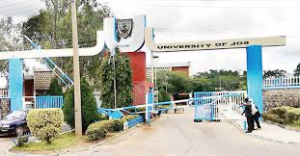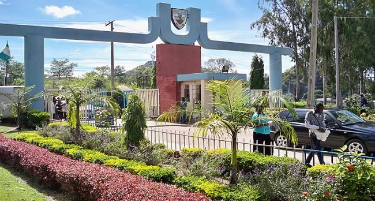On Tuesday, members of the Academic Staff Union of Universities (ASUU) at the University of Jos (UNIJOS) staged a protest within the university premises.
The demonstration was part of an ongoing effort to press for better funding for the education sector and improved welfare conditions for academic staff, among other critical issues.
The protest, led by the Chapter’s Vice Chairman, Prof. Kiri Jaryum, culminated in a march to the office of the Vice Chancellor, Prof. Tanko Ishaya. Here, the lecturers voiced their dissatisfaction with the Federal Government’s continued neglect of the union’s demands and its failure to honor previous agreements. These long-standing grievances have left the academic community increasingly frustrated and concerned about the future of higher education in Nigeria.
UNIJOS lecturers had issued a 14-day ultimatum to the Federal Government, demanding action on their concerns. On the day of the protest, they carried placards bearing various inscriptions, each highlighting their discontent with the government’s inaction. These messages underscored a shared sense of urgency and a call for the government to fulfill its commitments to avoid the disruption of another strike.
Some of the placards read slogans like, “Education is a Right, Not a Privilege,” “Honor Agreements Now,” and “Fund Our Universities Adequately.” The display was a powerful visual reminder of the lecturers’ ongoing struggle for a fair and just educational system that can meet the needs of both students and staff.
During the protest, Prof. Jaryum reiterated the union’s long-standing demands. He emphasized that improved funding for universities is not just a matter of financial necessity but also crucial for maintaining and enhancing the quality of education. He pointed out that without adequate resources, universities cannot effectively fulfill their mandate of teaching, research, and community service.
The Vice Chairman also highlighted the dire state of infrastructure in many Nigerian universities, including UNIJOS. He argued that without significant government intervention, these institutions would continue to struggle with dilapidated buildings, outdated equipment, and insufficient teaching materials. This, in turn, hampers the ability of lecturers to deliver high-quality education and conduct meaningful research.

Receiving the protesting lecturers, the Vice Chancellor of UNIJOS, Prof. Tanko Ishaya, commended the peaceful nature of the demonstration. He expressed appreciation for the lecturers’ decision not to disrupt the ongoing examinations, thereby showing their commitment to their students’ academic progress even while protesting.
Prof. Ishaya assured the protesters that their concerns would be conveyed to the relevant authorities. He acknowledged that many of the issues raised by ASUU affect the entire university system, not just UNIJOS. As such, addressing these issues is essential for the effective functioning of higher education institutions across Nigeria.
The Vice Chancellor’s response highlighted the interconnectedness of the problems faced by the university community. He noted that the lack of funding and inadequate welfare conditions for staff have broader implications for student outcomes and the overall quality of education. Therefore, he called for a concerted effort from both the government and stakeholders to address these challenges holistically.
The protest at UNIJOS is part of a larger, ongoing campaign by ASUU to secure better conditions for universities nationwide. The union has been at the forefront of advocating for increased funding, better infrastructure, and improved welfare for academic staff. These demands are seen as essential to reversing the decline in Nigeria’s educational standards and ensuring that the country can produce graduates who are well-equipped to contribute to national development.
As the 14-day ultimatum nears its end, the academic community and the broader public are watching closely to see how the Federal Government will respond. The lecturers’ protest at UNIJOS has added to the mounting pressure on the government to act decisively and fulfill its obligations. The outcome of this agitation will likely have significant implications for the future of higher education in Nigeria.
In conclusion, the UNIJOS protest underscores the urgent need for the government to address the critical issues facing the education sector. By honoring its agreements with ASUU and providing adequate funding for universities, the government can help create a more robust and effective educational system that benefits all Nigerians. The lecturers’ call for action is a reminder that the stakes are high, and the time for meaningful intervention is now.




